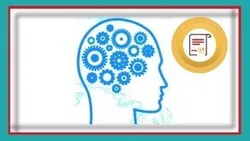
Learning Through Cognitive Psychology 
This course will explore the research-based principles of cognitive psychology to help you become a more effective and efficient learner. We'll cover metacognition, forgetting, and strategies such as spaced learning, retrieval practice, elaboration, and focused learning. We'll also discuss the advantages and disadvantages of popular study strategies and how to overcome procrastination. With the right strategies, you'll be able to get more out of your studying and see improvements in your academic performance. ▼
ADVERTISEMENT
Course Feature
![]() Cost:
Cost:
Free
![]() Provider:
Provider:
Edx
![]() Certificate:
Certificate:
Paid Certification
![]() Language:
Language:
English
![]() Start Date:
Start Date:
Self paced
Course Overview
❗The content presented here is sourced directly from Edx platform. For comprehensive course details, including enrollment information, simply click on the 'Go to class' link on our website.
Updated in [May 25th, 2023]
This course provides an overview of cognitive psychology and its application to learning. Learners will gain an understanding of metacognition, forgetting, and four specific strategies to improve learning: spaced learning, retrieval practice, elaboration, and focused learning. Additionally, learners will explore the advantages and disadvantages of other popular study strategies and learn how to overcome procrastination. By the end of the course, learners will have the knowledge and skills to become more effective and efficient learners.
[Applications]
After completing this course, learners can apply the research-based principles from cognitive psychology to become more effective and efficient learners. Learners can use metacognition to assess what they know and make informed choices. They can also use strategies such as spaced learning, retrieval practice, elaboration, and focused learning to improve their study habits. Additionally, learners can modify or adjust popular study strategies to make them more effective. Finally, learners can use the strategies discussed in the course to overcome procrastination and improve their academic performance.
[Career Paths]
1. Educational Psychologist: Educational psychologists use cognitive psychology to help students learn more effectively. They assess students’ learning styles, develop strategies to improve learning, and provide guidance to teachers and parents. Educational psychologists are in high demand as the need for personalized learning increases.
2. Instructional Designer: Instructional designers use cognitive psychology to create effective learning experiences. They design and develop instructional materials, create assessments, and evaluate the effectiveness of learning programs. Instructional designers are in high demand as more organizations move to online learning.
3. Learning and Development Manager: Learning and development managers use cognitive psychology to create and manage learning programs. They develop and implement training programs, assess the effectiveness of learning initiatives, and provide guidance to learners. Learning and development managers are in high demand as organizations look to improve their training and development programs.
4. Cognitive Scientist: Cognitive scientists use cognitive psychology to study how people think and learn. They conduct research on topics such as memory, problem-solving, and decision-making. Cognitive scientists are in high demand as organizations look to better understand how people learn and make decisions.
[Education Paths]
1. Bachelor's Degree in Cognitive Psychology: A Bachelor's Degree in Cognitive Psychology is a great way to gain an understanding of the research-based principles from cognitive psychology that will help you become a more effective and efficient learner. This degree will cover topics such as metacognition, forgetting, and study strategies, as well as the advantages and disadvantages of popular study strategies. With the development of technology, this degree is becoming increasingly popular and is a great way to gain a deeper understanding of the cognitive processes that underlie learning.
2. Master's Degree in Educational Psychology: A Master's Degree in Educational Psychology is a great way to gain an understanding of the research-based principles from cognitive psychology that will help you become a more effective and efficient learner. This degree will cover topics such as metacognition, forgetting, and study strategies, as well as the advantages and disadvantages of popular study strategies. With the development of technology, this degree is becoming increasingly popular and is a great way to gain a deeper understanding of the cognitive processes that underlie learning.
3. Doctorate Degree in Cognitive Neuroscience: A Doctorate Degree in Cognitive Neuroscience is a great way to gain an understanding of the research-based principles from cognitive psychology that will help you become a more effective and efficient learner. This degree will cover topics such as metacognition, forgetting, and study strategies, as well as the advantages and disadvantages of popular study strategies. With the development of technology, this degree is becoming increasingly popular and is a great way to gain a deeper understanding of the cognitive processes that underlie learning.
4. Master's Degree in Applied Cognitive Science: A Master's Degree in Applied Cognitive Science is a great way to gain an understanding of the research-based principles from cognitive psychology that will help you become a more effective and efficient learner. This degree will cover topics such as metacognition, forgetting, and study strategies, as well as the advantages and disadvantages of popular study strategies. With the development of technology, this degree is becoming increasingly popular and is a great way to gain a deeper understanding of the cognitive processes that underlie learning.
Course Provider

Provider Edx's Stats at AZClass
Discussion and Reviews
0.0 (Based on 0 reviews)
Explore Similar Online Courses

Wedding Dance Choreography Course

Improving Supply Chain Performance through Demand Planning

Python for Informatics: Exploring Information

Social Network Analysis

Introduction to Systematic Review and Meta-Analysis

The Analytics Edge

DCO042 - Python For Informatics

Causal Diagrams: Draw Your Assumptions Before Your Conclusions

Whole genome sequencing of bacterial genomes - tools and applications

Cognitive Psychology: Employee and Customer Behaviour

Cognitive Behavioral Therapy CBT Life Coaching Certification


Start your review of Learning Through Cognitive Psychology